Inductees
Nora Cagwin Whitcomb
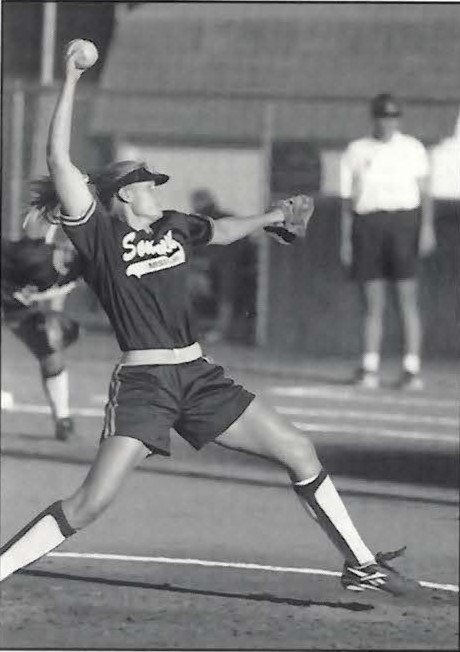
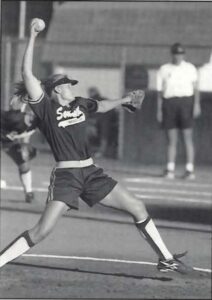
The interest from NCAA Division I softball programs came in in the mid-1990s to a suburban Kansas City pitcher, and some folks probably assumed that she would choose one from the soon-to-be Big 12 or Big 10 Conferences.
Instead, Nora Cagwin Whitcomb threw everybody a curveball – with pinpoint placement. You see, her heart fell for a competitive program in the Ozarks, the Missouri State Bears of the Missouri Valley Conference.
“I wanted to be a part of a team that felt like family – a program that helped me grow into a better person and player and challenged me on and off the field,” Whitcomb said.
Whitcomb not only found that became one of the Bears’ stars, and her success is why the Missouri Sports Hall of Fame proudly inducted her with the Class of 2025.
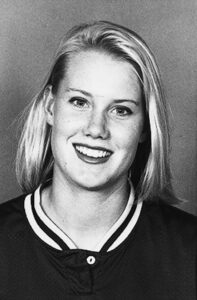
Whitcomb pitched from 1996 to 1999, with the Bears winning 128 of 220 games in her career. That included four consecutive Valley first-division finishes. The Bears won the Valley Tournament and advanced to NCAA Tournament Regional in each of her first three seasons.
Some 26 years since her last game, she holds the all-time record in strikeouts (767), ranks second in wins (71), saves (13) and shutouts (29), third in games pitched (148), games started (99) and complete games (69), and fourth in innings pitched (706.1). She also issued only 47 walks.
Whitcomb was a three-time First Team All-Valley selection and on its all-tournament team (1997, 1998, 1999) and was the Valley’s Pitcher of the Year in 1998 and 1999; and the Valley’s Most Valuable Player in 1998.
All this from a player who was a 1995 graduate of Olathe East (Kan.) High School and drew interest from the University of Kansas, the University of Nebraska, the University of Colorado and Iowa University.
“(My parents) sacrificed time, summers, weekends, vacations and money to always be there to watch me play,” Whitcomb said. “I wanted to play somewhere close enough they could still come watch games to cheer me on.”
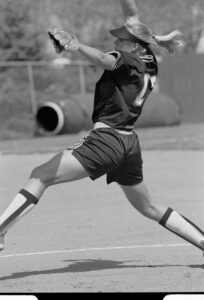
Coach Holly Hesse (MSHOF 2018) and assistant coaches Beth Perrine and Sue Frederick would shape her life, not just her career.
“I admire and appreciate that Holly, Sue and Beth encouraged us to be better students, players but most importantly better people,” Whitcomb said.
Whitcomb’s success is even more impressive considering she adjusted to the distance from the rubber to the plate in college softball, which is 43 feet, or three feet further back than in high school.
“It was a whole new game for me because I had to learn how to get my pitches to move further back and still hit my spots,” Whitcomb said. “I was pitching against girls that were stronger and better hitters than I ever faced. I had to not just be physically stronger but mentally stronger also.
Whitcomb, who fired riseballs and an outside drop curveball, also credits catchers Toni Rieke and Tawyna Grout, with Grout and Whitcomb the battery for their final three seasons.
“(Grout) worked so hard behind the plate, and we were really great team,” Whitcomb said. “She knew my pitches and if they were working well or not. She knew exactly what pitch to call and had such fantastic intuition.”
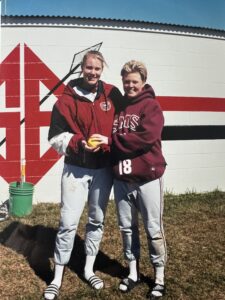
Overall, the team worked well together. That’s what Whitcomb hopes fans understand. They set a common goal and worked toward it. That led to playing in a regional in California and two in Oklahoma.
That said, she also credits Kansas City-area pitching coach Chuck Walters. She was about 12 when he began working with her.
“I have always been tall and, at that age, I imagine I looked more like a baby giraffe on the mound trying to pitch, all legs and arms,” Whitcomb said. “Having good coordination was tricky. I was constantly growing, and trying to get my body to work together was difficult. Besides my parents, who always believed in me, Chuck believed in me when other coaches didn’t.”
In addition to the Missouri State coaches and Walters, Whitcomb long had the support of her parents, Bill and Solveig Cagwin, and her sister, Beth.
These days, she is mom to Will, Annika and Luke, and a school teacher in Olathe who also provides pitching lessons.
“I hope that my teammates and coaches would think of me as being a hard worker, patient and kind to others, respectful of my opponents and the game,” Whitcomb said. “I hope I added something positive to the MSU program and contributed to the game I love.”